________________
Shri Mahavir Jain Aradhana Kendra
www.kobatirth.org
Acharya Shri Kailashsagarsuri Gyanmandir
194
Atman and Mokşa
self-centred will, and which therefore, were utterly despicable, will not surely die out with the removal of their odious atmosphere in which egoism had developed them. But they will get an ever nobler interpretation, ever more elevating and satisfying significance; for they have gone through a baptism of fire, by which the last trace of egoism has been thoroughly consumed. The old evil master is eternally burnt, but the willing servants are still here and ever ready to do their service, now more efficiently, for their new legitimate and authoritative lord.”1 Mahāyānism developed the idea of a kind of enternal Being which is at the back of everything and acts as the source of everything. This eternal Being is a storehouse of consciousness and is itself an intelligent principle; all the phenomenal things of the world not only ultimately rest in it but are its manifestations. It is the eternal spiritual principle at the back of all momentary existences. It changes but only internally; as such it does not disappear, nor does it pass out of existence as an entity. It is the ultimate resort of all things. Everything as absorbed in this final being known as the Dharmakāya persists even in Nirvāņa; and Nirvāṇa, according to the Mahāyänists, means the persistence of this Dharmakāya and the complete absorption of all particular finite existences in it. The Dharmakāya possesses its own will which manifests itself in all the particular things. Suzuki describes the state of Nirväņa as one of enlightenment and not of darkness and blankness.
1 Suzuki D. T.: Outlines of Mahāyāna Buddhism, pp.54-55.
For Private And Personal




